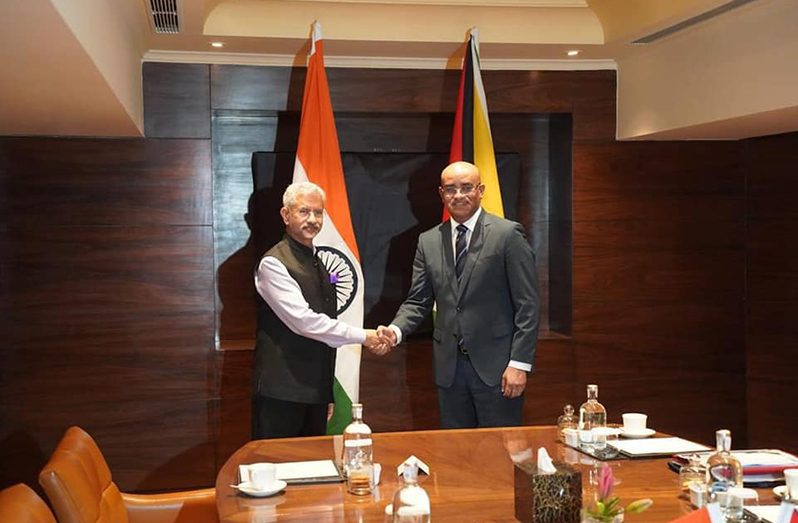GUYANA will soon sign a Memorandum of Understanding (MoU) with India to boost cooperation in the energy sector, Vice-President Bharrat Jagdeo announced on Friday.
The VP was at the time speaking at a press conference at the Arthur Chung Conference Centre, where he disclosed that India’s Minister of External Affairs Dr Subrahmanyam Jaishankar will be visiting Guyana to ink the MoU.
He explained that the MoU is still before India’s cabinet awaiting approval.
Dr Jagdeo recently returned from India, where he led a high-level delegation to advance discussions on bilateral cooperation.
The visit was seen as a continued engagement between the two countries after the official visit of President, Dr. Mohamed Irfaan Ali, in January.
Outside of energy, Dr Jagdeo said that Guyana is considering the purchase of defence capabilities from India to help preserve and protect its oil-and-gas sector, marine borders, and exclusive economic zones.
He referenced a number of defence capabilities which are primarily for peaceful purposes and for exerting more power over maritime boundaries or exclusive economic zones.
The Vice-President said that the energy MoU will enhance bilateral cooperation and will not only cover crude oil, but the whole energy sector from renewable energy to solar energy.
“The MoU will deal with a number of issues. It will deal with exploring the possibility of trading in crude oil, but we agreed with the minister that this has to be beneficial to both countries and it has to follow market conditions,” Dr Jagdeo told reporters.
However, he pointed out that “there is no agreement to sell any oil to India at this point in time, and any such agreement in the future will have to be competitive and will have to benefit both parties.”
“India has an enormous capacity in many areas, and we hope to benefit from the strengthening of the regulatory regime; their expertise in strengthening the regulatory regime here for the oil-and-gas sector, as well as building capacity in the Ministry of Natural Resources,” he said.
The burgeoning energy sector in Guyana is one of the most critical and promising areas of the country’s economy. With the recent discoveries of several offshore oil reserves, Guyana has become one of the most significant players in the global energy market.
To this end, the Vice-President also announced that the upcoming reclaiming of 20 per cent of the giant Stabroek oil block from the ExxonMobil-led consortium will open more windows for bilateral partnerships.
India, Qatar, Kuwait, the United Kingdom and the United Arab Emirates (UAE) have already expressed their interest.
“So we have made no definitive decision on the 20 per cent being relinquished, that those would be all available for bilateral engagements or auction, although they are potentially available for the discussions at the bilateral level.
“And that is what we spoke of in India. We have also indicated to several other governments that are interested in participating at a bilateral level with us, because we believe that some bilateral engagements could complement the more commercial-type engagements with the private sector,” he said.
ExxonMobil’s contract allows Guyana to reclaim unexplored portions this year. The Exxon group has missed investment deadlines for portions of the block not under exploration or development.
Under the terms of the licence, Exxon must relinquish a minimum of 20 per cent of the contract area not retained under an exploration or production licence.
The Stabroek Block is 6.6 million acres (26,800 square kilometres), with its gross recoverable resource now estimated to be more than 11 billion oil-equivalent barrels, including Liza and other successful exploration wells.
President Dr. Irfaan Ali last year announced that the government hopes to award the contracts by the end of May. Guyana is among 65 countries that will be launching the auction of oil blocks.
The 14 blocks being put up for auction range in acreage from 1,000 sq. km to 3,000 sq. km, with 11 in shallow water, and the other three in deep water.
The bidders will be evaluated on their work programmes, financial offers, and local-content commitments.
There won’t be any restrictions on the number of bids a company is allowed to submit, but a successful bidder will be limited to an award of no more than three blocks.
There is a participation fee of US$20,000 for the bidding process for each block.
The winning bidders of the shallow-water exploration blocks must pay a minimum of US$10 million signing bonus, and twice that amount for the deep-water blocks.
Bidders will also be required to provide a development plan for consideration, along with their financial bids.
Under the new fiscal terms and other conditions for future Production Sharing Agreements (PSAs), successful companies will be subjected to 50 per cent profit sharing, a royalty rate of 10 per cent, and corporate tax of 10 per cent, among other things.



.jpg)










